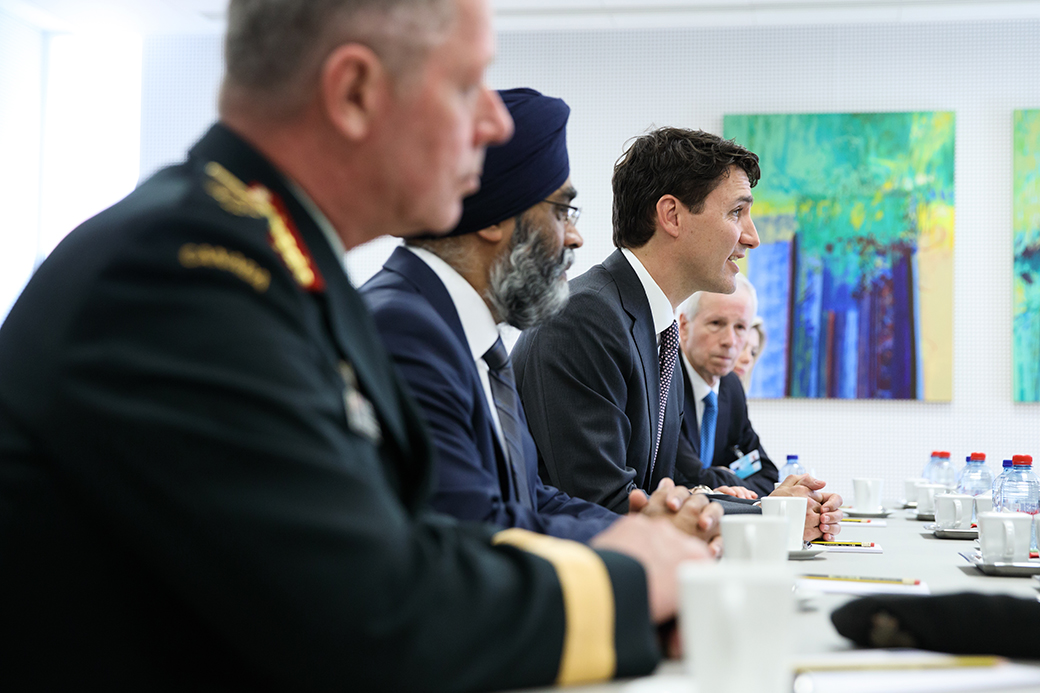“Many of you have worried that Canada has lost its compassionate and constructive voice in the world over the past 10 years,” said Justin Trudeau following the election of a Liberal majority government in 2015. “Well, I have a simple message for you: on behalf of 35 million Canadians, we’re back.”
It was foreign policy week in Ottawa last week. Foreign Affairs Minister Chrystia Freeland made a major foreign policy statement in the House of Commons; Defence Minister Harjit Singh Sajjan released Strong, Secure, Engaged: Canada’s Defence Policy; and Minister of International Development Marie-Claude Bibeau announced Canada’s feminist international assistance policy.
Though the statements will be read in foreign ministries abroad, Canadians are the intended audience. Ministers are trying to shore up support for the Trudeau government at home, not plot a new direction for Canada abroad.
Making women and children the focus of international development assistance makes sense. In 2014, that is what Stephen Harper decided to do. His Conservative government allocated $4 billion “to improve maternal, newborn and child health” around the world.
In contrast, the Trudeau Liberals are allocating no new money for their feminist foreign policy initiative. Spending $150 million over five years to support feminist groups abroad will come from funds already set aside for foreign assistance.
Despite the inspiring prose of the development assistance statement, with no new money — at a time when military spending is to be increased by 70 per cent — women in Canada are not going to be tricked into thinking the Liberals have made women and children a priority.
Development assistance spending of $5 billion compares to current defence spending of nearly $20 billion per year, defence spending which the Liberals promise to increase to $33 billion over the next 10 years.
New military spending is what Donald Trump has asked Canada and other NATO members to do. The Trudeau government is jumping to comply.
In addition to playing up to Trump in advance of NAFTA renegotiations, the Liberals hope to pre-empt calls from the Conservative opposition to “support our troops” with the defence minister’s pledge to buy more military hardware.
Reading the three policy statements, it is difficult to see what the Trudeau Liberals have to offer the world.
In her major foreign policy address, Minister of Global Affairs Chrystia Freeland pointed to the benefits Canada has derived from “a global order based on rules.”
In fact, the postwar global order was based on fear, not rules; on nuclear deterrence, not international law.
Both the old Soviet Union and the U.S. possessed the capacity to destroy the other. Since an attack would be followed by a counterattack, it was not an option.
With the fall of the Berlin Wall in 1989, the Cold War era of “mutually assured destruction” was supposed to be over. Without an adversarial relationship, the nuclear arms race was no longer necessary, and a peace dividend could be declared.
When the U.S. moved to incorporate the former Soviet allies into NATO, it provoked a Russian nationalist response and created new East-West tensions.
The natural role for Canada would be to promote nuclear arms reductions and conventional arms control, and work with other middle powers to de-escalate tensions between the U.S. and Russia.
Instead Minister Freeland takes aim at Russian expansionist policies in Crimea and gives U.S. global imperialist foreign policy a free pass.
The foreign affairs minister acknowledges the danger of Canada acting as a client state of the Americans. Incredibly she uses this danger to justify increased purchases of military hardware — exactly what Washington always wants Canada to do — because much of the money will be spent in the U.S.
This resort by Freeland to “hard power” as a supposed antidote to Canadian conformism to U.S. wishes is unconvincing in the extreme.
Spiegel Online reported that when Angela Merkel asked Justin Trudeau to support a German initiative at the upcoming G20 summit to pressure the U.S. president on climate change, he declined to go along. For Trudeau “appeasement” of the U.S. had replaced alignment with Merkel against Trump on climate change.
“We’re back” all right: Canada’s new foreign policy is the same as its old foreign policy.
To get along with the U.S., Canada looks to avoid irritating Washington, and will go along with what it wants Canada to do, even if it means jettisoning Ottawa’s policy priorities.
Duncan Cameron is former president of rabble.ca and writes a weekly column on politics and current affairs.




